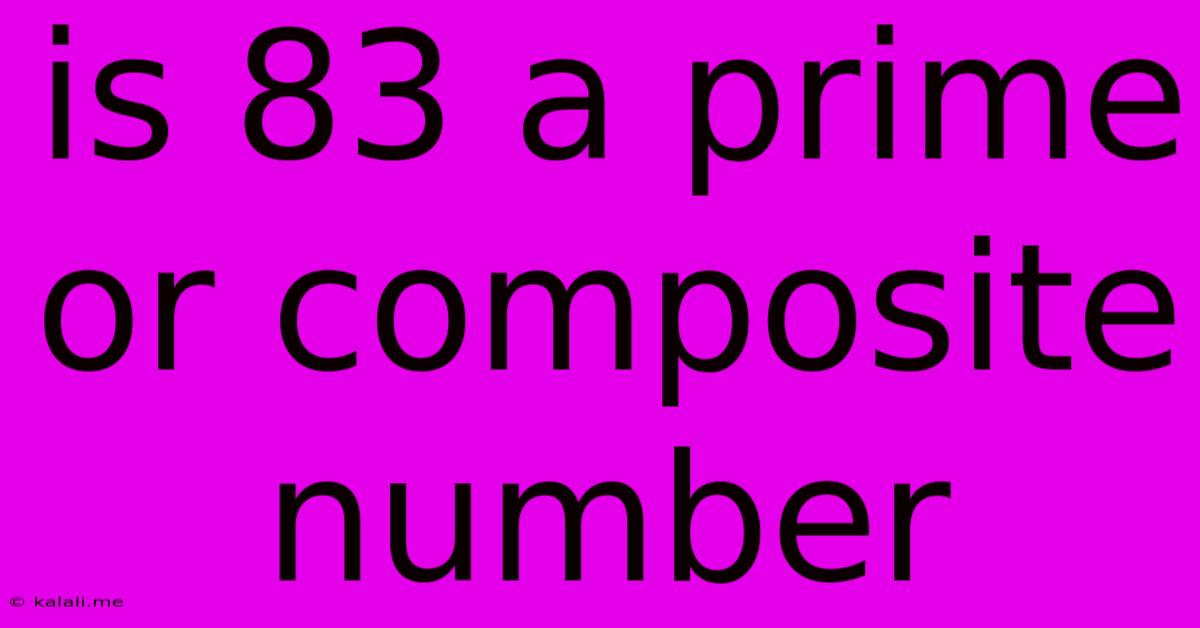Is 83 A Prime Or Composite Number
Kalali
May 10, 2025 · 2 min read

Table of Contents
Is 83 a Prime or Composite Number? A Simple Explanation
Meta Description: Learn whether 83 is a prime or composite number. This article provides a clear explanation and explores the concepts of prime and composite numbers. Understand how to determine the primality of a number with simple methods.
Determining whether a number is prime or composite is a fundamental concept in mathematics. Let's delve into whether 83 fits into the category of prime or composite numbers.
Understanding Prime and Composite Numbers
Before we determine the nature of 83, let's quickly review the definitions:
-
Prime Number: A prime number is a whole number greater than 1 that has only two divisors: 1 and itself. This means it's not divisible by any other whole number without leaving a remainder. Examples include 2, 3, 5, 7, 11, and so on.
-
Composite Number: A composite number is a whole number greater than 1 that has more than two divisors. In other words, it can be divided evenly by numbers other than 1 and itself. Examples include 4 (divisible by 1, 2, and 4), 6 (divisible by 1, 2, 3, and 6), and 9 (divisible by 1, 3, and 9).
Numbers less than or equal to 1 are neither prime nor composite.
Determining if 83 is Prime or Composite
To determine if 83 is prime or composite, we need to check if it's divisible by any whole number other than 1 and itself. We can do this by checking for divisibility by prime numbers. We only need to check prime numbers up to the square root of 83 (approximately 9.1), since any factor larger than that would have a corresponding factor smaller than 9.1 that we would have already checked.
The prime numbers less than 9.1 are 2, 3, 5, and 7. Let's check the divisibility:
- Divisibility by 2: 83 is not divisible by 2 because it's an odd number.
- Divisibility by 3: The sum of the digits of 83 is 8 + 3 = 11. Since 11 is not divisible by 3, 83 is not divisible by 3.
- Divisibility by 5: 83 does not end in 0 or 5, so it's not divisible by 5.
- Divisibility by 7: 83 divided by 7 is approximately 11.86, leaving a remainder. Therefore, 83 is not divisible by 7.
Since 83 is not divisible by any prime number less than its square root, it is not divisible by any whole number other than 1 and itself.
Conclusion: 83 is a Prime Number
Therefore, based on our divisibility checks, we can confidently conclude that 83 is a prime number. It only has two divisors: 1 and 83.
Latest Posts
Latest Posts
-
Is Keri Russell Related To Kurt Russell
Jul 02, 2025
-
What Is Half Of 1 4 Teaspoon
Jul 02, 2025
-
How Many Cups In A Pound Of Hamburger Meat
Jul 02, 2025
-
Imagery Or Figurative Language From Romeo And Juliet
Jul 02, 2025
-
What Is A Quarter Of A Million
Jul 02, 2025
Related Post
Thank you for visiting our website which covers about Is 83 A Prime Or Composite Number . We hope the information provided has been useful to you. Feel free to contact us if you have any questions or need further assistance. See you next time and don't miss to bookmark.